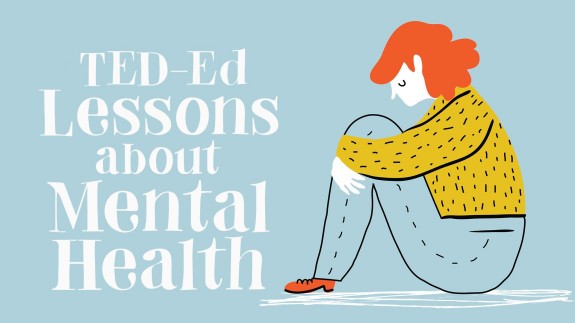8 TED-Ed Lessons about mental health
By Laura McClure on May 17, 2017 in TED-Ed Lessons

TED-Ed
Depression, bipolar disorder, OCD, narcissism, PTSD, chronic stress, schizophrenia— these medical conditions impact millions of people around the world, yet are often misunderstood. How much do you know about the symptoms and treatments?
In honor of Mental Health Awareness Month, watch these 8 TED-Ed Lessons:
1. What is depression?
Depression is the leading cause of disability in the world; in the United States, close to ten percent of adults struggle with the disease. But because it’s a mental illness, it can be a lot harder to understand than, say, high cholesterol. Helen M. Farrell examines the symptoms and treatments of depression, and gives some tips for how you might help a friend who is suffering. Watch this TED-Ed Lesson below.
2. What is bipolar disorder?
The word bipolar means ‘two extremes.’ For the many millions experiencing bipolar disorder around the world, life is split between two different realities: elation and depression. So what causes this disorder? And can it be treated? Helen M. Farrell describes the root causes and treatments for bipolar disorder. Watch this TED-Ed Lesson below.
3. Debunking the myths of OCD
There’s a common misconception that if you like to meticulously organize your things, keep your hands clean, or plan out your weekend to the last detail, you might be OCD. In fact, OCD (Obsessive Compulsive Disorder) is a serious psychiatric condition that is frequently misunderstood by society and mental health professionals alike. Natascha M. Santos debunks the myths surrounding OCD.
Watch this TED-Ed Lesson below.
4. The psychology of narcissism
Narcissism isn’t just a personality type that shows up in advice columns; it’s actually a set of traits classified and studied by psychologists. But what causes it? And can narcissists improve on their negative traits? W. Keith Campbell describes the psychology behind the elevated and sometimes detrimental self-involvement of narcissists. Watch this TED-Ed Lesson below.
5. The psychology of post-traumatic stress disorder
Many of us will experience some kind of trauma during our lifetime. Sometimes, we escape with no long-term effects. But for millions of people, those experiences linger, causing symptoms like flashbacks, nightmares, and negative thoughts that interfere with everyday life. Joelle Rabow Maletis details the science behind post-traumatic stress disorder, or PTSD. Watch this TED-Ed Lesson below.
6. How stress affects your brain
Stress isn’t always a bad thing; it can be handy for a burst of extra energy and focus, like when you’re playing a competitive sport or have to speak in public. But when it’s continuous, it actually begins to change your brain. Madhumita Murgia shows how chronic stress can affect brain size, its structure, and how it functions, right down to the level of your genes. Watch this TED-Ed Lesson below.
7. The truth about electroconvulsive therapy (ECT)
In 1982, a young nurse was suffering from severe, unrelenting depression. She couldn’t work, socialize or concentrate. One controversial treatment changed everything: after two courses of electroconvulsive therapy (ECT) her symptoms lifted. So what exactly is electroconvulsive therapy and why is it so stigmatized? Helen M. Farrell details the history and evolution of ECT. Watch this TED-Ed Lesson below.
8. What is schizophrenia?
Schizophrenia was first identified more than a century ago, but we still don’t know its exact causes. It remains one of the most misunderstood and stigmatized illnesses today. So what do we actually know about its symptoms, causes, and treatments? Anees Bahji investigates. Watch this TED-Ed Lesson below.
Tags: Bipolar, Depression, Emotional Health, Health, Mental Health, Narcissism, OCD, Psychology
